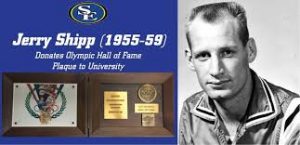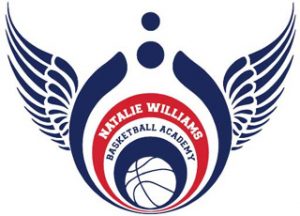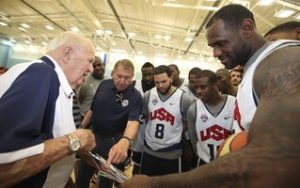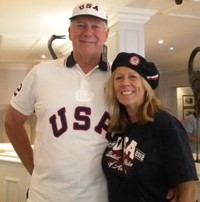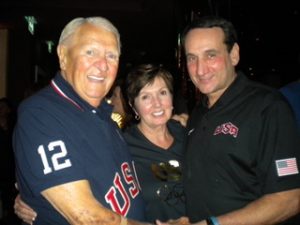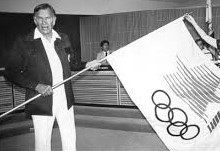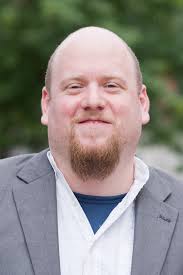The NBA Finals date back to 1947 (when they were known as the Basketball Association of America Finals) and the very 1st NCAA tourney was held in 1939. Olympic basketball competition is even older: it debuted as a demonstration event in 1904 and the men’s version became a medal sport in 1936, with the women finally getting their chance to go for the gold in 1976. The United States has dominated Olympic basketball competition from the start: the men have won 15 gold medals in the 18 tournaments they have participated in during the past 84 years, while the women have won 8 gold medals in the 10 tournaments in which they have competed during the past 44 years. Those of you who were looking forward to the 2020 Olympics opening ceremonies in Tokyo on July 24, 2020 will have to wait an extra 364 days, as the coronavirus caused a postponement until July 23, 2021. Due to the absence of college basketball since mid-March, HoopsHD’s Jon Teitel decided to fill the void by trying to interview as many prior Olympic players/coaches as possible so that you have something to read this summer while not watching the Summer Games. We continue our coverage by chatting with Jerry Shipp’s wife Novaline Shipp and daughters Shannon Cooper/Sherra Aguilar about Jerry winning a gold medal in 1964.
Jerry was born prematurely to a hitchhiking mom suffering from tuberculosis in Louisiana and later spent 11 years in an orphanage in Oklahoma: how rough was his childhood, and how did Ed/Ozella Shipp change his life by adopting him at age 16? His birth family lived in Fort Worth, TX: his father was a traveling musician who moved around a lot with his mother, who gave birth to Jerry when she was 18. His mother had an older friend who took care of her and she instructed him to call a preacher to take him to the Tipton Home Orphanage after she died so he could have an education. The preacher was a lifelong friend of the Shipps who lived in Arkansas but would come by to visit. This was during the Depression so she was worried about him not going to school if he had remained with his relatives. They went to the orphanage around Christmas to meet him and decided to adopt him. He had 1 old man watch him play basketball all the time who was very special to him. He asked the old man if he should go live with the Shipps and the man advised him to do so. He had a little tin suitcase but no clothes: he was worried about Ozella making fun of him but she never did because she was such a good woman. He was born prematurely in a ditch and they wrapped him in whatever they had. His 1st bed was a shoebox and his family did not expect him to make it through the 1st night. The Shipps supported the orphanage and adopted him at age 16. Ozella was a 1st grade teacher for 50 years who did not have any kids of her own. Jerry was making F’s at 1st but eventually made A’s and B’s after he focused on his education. He was actually a better baseball player and even got drafted by the Yankees as a pitcher who threw 98 MPH! He asked the Shipps what to do and they suggested he get his college degree. Getting adopted definitely changed his life: he was going down the wrong road but it all changed for the better.
His graduating class at Blue High School was comprised of 13 students: what made him choose Southeastern Oklahoma State? The Shipps wanted him to stay nearby. Coach Bloomer Sullivan was an icon who became a father-figure to him.
As a member of the Savage Storm he led the conference in scoring twice and set a conference record by scoring 54 PTS in a game vs. Phillips University in 1957: what was his secret to being a great scorer? When he was little all of the kids in the orphanage were placed in a room to have a snack. He would draw an imaginary circle on the ceiling, roll some biscuits up into little balls, and then throw them at the circle. As a high school freshman he had a basketball that was flat but would stuff it with rags, crawl through the window of the gym, and practice shooting for 2-3 hours at night. That scoring record still stands today even after the implementation of the 3-PT line. Dennis Rodman almost broke the record 1 night but fell 1 PT short. He said that if you were a true shooter then you could shoot with any kind of ball.
He also set a conference record by making 19-19 FTs in a game vs. East Central in 1958: what made him such a great FT shooter? 1 year he played in Egypt with his AAU team and they brought out a heavier soccer ball but he was always able to shoot once he got used to it due to his rotation/follow-through. I have worked with shooters all of my life as a coach and some people are just born with it. I have been told by many people who watched him that he was the best shooter they had ever seen.
In the summer of 1959 he was drafted 64th overall by the Knicks: did he see that as a validation of his college career, or the realization of a lifelong dream of reaching the NBA, or other? His lifelong dream was to go to the Olympics, even after not making the team in 1960 as the 1st alternate. He had to compete against great players in the 1964 Olympic Trials such as Rick Barry. Making the NBA was not his main goal. We had our 1st child in 1964 after the Olympics when he was around age 30 and he decided to stay with AAU basketball. He was very appreciative of being drafted but going to New York was not very appealing.
Instead of going pro he joined the Phillips 66ers where he was a 3-time AAU All-American and won a pair of national titles in 1962/1963: what did it mean to him to receive such outstanding honors, and what did it mean to him to win a pair of titles? The CEO of Phillips (Boots Adams) was close to him and wanted him to stay there for as long as possible. Every award meant a lot to him because he worked so hard for it. He told me that he got to see the world, drink tea with kings, and see the Pyramids in Egypt. He loved the camaraderie of the team and still remains friends with his teammates: they would have reunions every 5 years and were almost like brothers. He always knew that he would become a coach/educator someday so he could show kids that you did not need to come from a big city or have the best shoes to accomplish your goals. You can come from any background and end up doing anything.
He won a gold medal with team USA at the 1963 Pan American Games while leading the team with 15 PPG, then won another gold medal at the 1964 Olympics while again leading the team in scoring: what did it mean to him to represent his country, and what did it mean to him to win a pair of gold medals? Every time his Pam Am Games team would win the crowd in Brazil would get angry and throw stuff onto the court. 1 time he got hit in the mouth with a piece of metal right before halftime: they just sewed him up while he sat on the bench and he finished the game as the team’s leading scorer! Winning the Olympics was his main goal in life so when they put the medal around his neck he had tears in his eyes. He was captain of the team and he felt so humbled by it. He had a teacher as a child named Ms. Maynard: he was not a good student and she told him that he would never amount to a hill of beans. When he got his medal and bent down to accept it he was thinking to himself, “Ms. Maynard, I hope that you are watching!” The players voted him team captain despite the fact that there were guys from more established schools like Bill Bradley at Princeton. Winning a gold medal was his dream come true: even when he watches the Olympics today it still means a lot to him because he is so patriotic.
After retiring from basketball he spent many years working in business for Phillips: how did he enjoy the business world? He loved Phillips. In the early 1970s the US started integrating more schools and would start busing kids to schools. Phillips wanted him to move to Memphis but then his kids would have had to take a bus to school downtown so he decided to go into coaching/teaching instead.
His alma mater retired his #30 jersey: where does that rank among the highlights of his career? He was proud of the jersey retirement but even prouder to dedicate his gold medal to the university. They have it enclosed in bulletproof glass in a special case in their gymnasium so that everyone can see it and enjoy it. That shows you how much his school means to him: he loves Southeastern and was very active with the alumni association for a long time.
He was inducted into many Halls of Fame including the Oklahoma Sports Hall of Fame/Helms Athletic Foundation Hall of Fame/NAIA Hall of Fame: when people look back on his career, how do you think that he should be remembered the most? What meant the most to him was for kids to know that you do not need to have a fancy background to succeed. He wanted to give every kid a shot because even a barefoot player might be the best on the team! Bill Bradley was roommates with my dad and took some jabs at him about where he came from but his legacy is that you do not have to come from Princeton to make it: you just need to prove it on the court. He always said to never be in awe of anyone and was not scared of anyone: we are so proud of him. He was the best shooter that I have ever seen even though he was self-taught.

